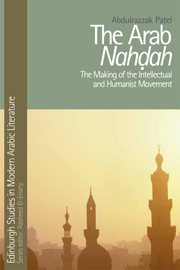Book contents
- Frontmatter
- Contents
- Series Editor's Foreword
- Acknowledgements
- Preface
- Introduction: Perspectives, Paradigms and Parameters
- 1 Contemporary Interpretations of the Nahḍah: Tradition, Modernity and the Arab Intellectual
- 2 The Reintegration of Pre-modern Christians into the Mainstream of Arabic Literature and the Creation of an Inter-religious Cultural Space
- 3 Guardians of the Pre-modern Arab-Islamic Humanist Tradition: Legends without a Legacy, a Tradition without Heirs
- 4 Language Reform and Controversy: The al-Shartūnīs Respond in Defence of the Pre-modern Humanist Tradition
- 5 Arabism, Patriotism and Ottomanism as Means to Reform
- 6 Arab Intellectuals and the West: Borrowing for the Sake of Progress
- 7 Education, Reform and Enlightened Azharīs
- 8 Enacting Reform: Local Agents, Statesmen, Missionaries and the Evolution of a Cultural Infrastructure
- Conclusion
- Bibliography
- Index
5 - Arabism, Patriotism and Ottomanism as Means to Reform
Published online by Cambridge University Press: 05 October 2013
- Frontmatter
- Contents
- Series Editor's Foreword
- Acknowledgements
- Preface
- Introduction: Perspectives, Paradigms and Parameters
- 1 Contemporary Interpretations of the Nahḍah: Tradition, Modernity and the Arab Intellectual
- 2 The Reintegration of Pre-modern Christians into the Mainstream of Arabic Literature and the Creation of an Inter-religious Cultural Space
- 3 Guardians of the Pre-modern Arab-Islamic Humanist Tradition: Legends without a Legacy, a Tradition without Heirs
- 4 Language Reform and Controversy: The al-Shartūnīs Respond in Defence of the Pre-modern Humanist Tradition
- 5 Arabism, Patriotism and Ottomanism as Means to Reform
- 6 Arab Intellectuals and the West: Borrowing for the Sake of Progress
- 7 Education, Reform and Enlightened Azharīs
- 8 Enacting Reform: Local Agents, Statesmen, Missionaries and the Evolution of a Cultural Infrastructure
- Conclusion
- Bibliography
- Index
Summary
The emergence of the ethnic nationalistic movements that eventually destroyed the idea of political unity among Muslims, Christians and others within an Ottoman context was a development that belonged largely to the early decades of the twentieth century. Prior to this, most Arab Christian and Muslim thinkers were leading their communities to a closer union with the ultimate aim of seeking reform, progress and civilisation, while not inciting revolution. The following themes which permeate the intellectual thought of the nahḍah are indicative of the aspirations of prominent Christian and Muslim thinkers in the propagation and diffusion of these ideas: (1) the revival of the Arabic language and culture as a cornerstone of Arab identity (Arabism); (2) the idea of love of homeland (patriotism); and (3) an emphasis on religious tolerance, cooperation and unity within an Ottoman framework of reference (Ottomanism). This chapter examines the key concepts of Arabism, patriotism and Ottomanism, and shows how Arab reformers were using these ideals interchangeably to create unity and harmony among their fellow countrymen with the ultimate aim of seeking reform and liberation from European control. The chapter furthermore aims to ascertain the position of nahḍah literati vis-à-vis the Ottoman Empire. Using examples from the humanist literature of the nahḍah, the central argument developed is that the majority of nahḍah thinkers and literati, regardless of religious affiliation or intellectual orientation, were Ottoman patriots who clearly stood for firm ties with the Ottoman Empire.
- Type
- Chapter
- Information
- The Arab NahdahThe Making of the Intellectual and Humanist Movement, pp. 127 - 158Publisher: Edinburgh University PressPrint publication year: 2013



